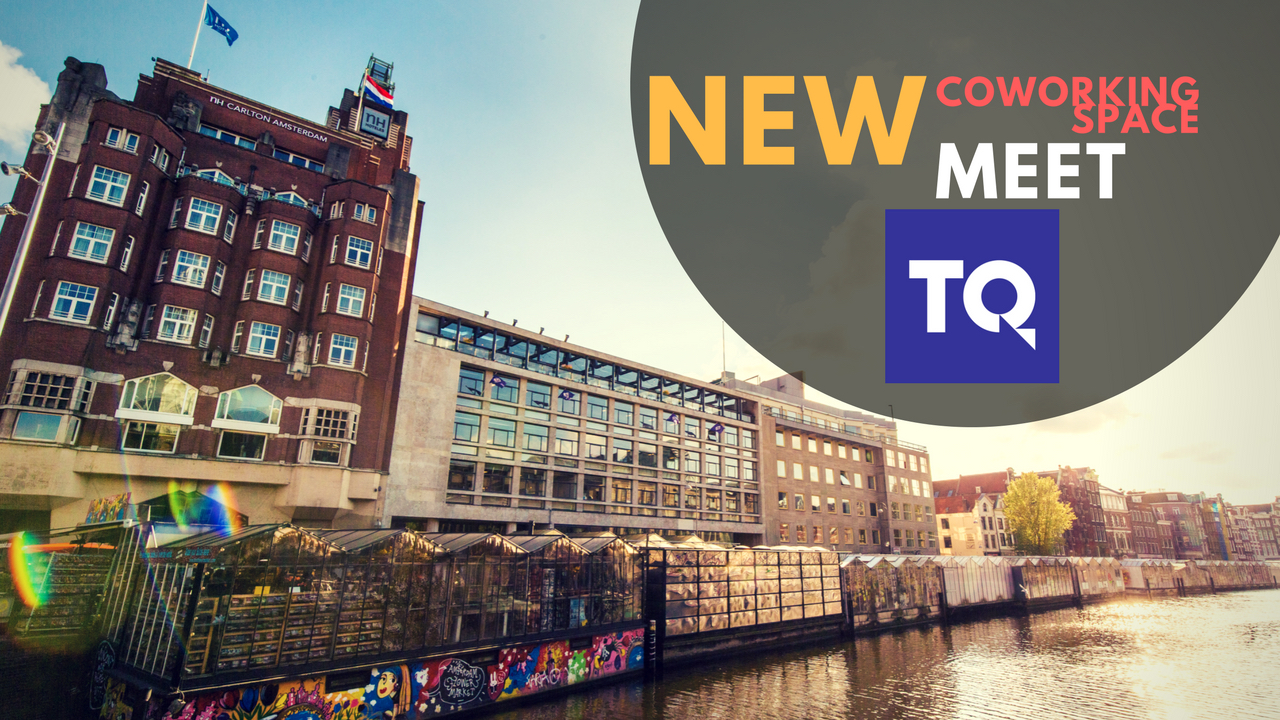- TQ is a tech hub in Amsterdam, founded by TNW in 2016
- Recently renovated, it houses a private club for members and experts to meet
- TQ prides itself as a “local space for an international network”
What do you get if you add a dollop of accelerator culture, a dash of coworking, mix in some corporate heavyweights and fledgling startups, and sprinkle on a garnish of world domination?
You get TQ.
OK, the world domination may be a step too far, but TQ is a “curated tech hub” in the heart of Amsterdam with a laser focus of breaking its startups into the international market. It was founded in 2016 by TNW, with corporate partnerships in the form of Google for Entrepreneurs, Booking.com, KPMG and ABN AMRO.
And TQ is taking a rather different approach to startup growth, as Patrick Nijssen, marketing manager at TQ, explained: “We are not a coworking space, we’re a curated tech hub. We don’t give people their own desks and let them be. We’re actively building a tech community that is eager to help each other grow.”
“So, we’re neither an accelerator nor a coworking space. But the fact that we’re constantly bringing in mentors to help the startups with their challenges and the fact that we have a full program of events and workshops, means we have some common traits with an accelerator, more so than a coworking space,” Nijssen added.
[huge_it_slider id=”28″]
TQ’s community is split into three main groups: residents, members and partners. Its residents are startups with international ambitions, who have a diverse set of team members and a scalable product. These startups have their own dedicated office space within TQ, ranging from five to around 40 desks.
Members are individuals that can make use of the facilities and contribute to the community in terms of knowledge and network. These are mainly founders, investors or industry experts. Partners make up the link between the hub’s corporate connections and the community, which is a nice alternative to having an entire corporate department set up shop in your workspace.
Currently, TQ’s community comprises of around 500 residents, spread out over 50 startups and it also has around 150 members. In October 2017, the hub celebrated its one-year anniversary, where Eric Schmidt, the former Google CEO, popped in for a fireside chat on entrepreneurship and declared it to be “a Silicon Valley under one roof”.
Members are welcomed into the hub’s recently renovated private club, where they have a space to work and meet. They can connect with other founders, investors and experts at the club and during events. They can also make use of the facilities, like meeting rooms, phone booths and even the smallest disco in the world.
“Our renewed club space and offering will help facilitate more meaningful connections between our residents and members, which in turn helps the startups in our community grow faster and better,” Nijssen added.
TQ also runs an “Office Hours” program, which are one-on-one mentorship sessions where its partners come in to help its startups to solve real-life business cases. Another example is “Traction”, a matchmaking event between four of its resident startups and corporate partners. These back-to-back meetings help selected startups solve their various growth challenges.
The future of work
How is TQ different from other workspaces? Like so many spaces, they are quick to mention their community. The difference is, they really are doing some pretty cool stuff, as Nijssen explained: “We’re creating a community where you can meet founders from small and larger startups, mingle with experts of every discipline, and investors from any industry. It’s a space where we have startups tackling the most difficult problems with the use of machine learning, robotics or other intelligent technology.”
“Great examples of startups in our space that are well on their way to doing that are Connecterra, who are on a mission to make global agriculture more productive and sustainable using sensors and artificial intelligence, and No Isolation, who builds robots designed to reduce social isolation in vulnerable groups in society,” Nijssen added.
There’s also the emphasis on the concept of being a “local space for an international network”, which is more than just a fluffy catchphrase – you don’t get a spot at TQ unless you’re focused on international growth. Nijssen said: “One of our curation criteria for being eligible as a startup in our network is having an internationally launched product, that can grow exponentially, with a diverse team. This means we’re a very international community.”
“Furthermore, we want to help startups grow tenfold, not just double in size, which means that these companies have to cross their national borders as soon as possible. That’s why we emphasise constantly the importance of having international ambitions. And you need an international network for that,” he added.
The hub is currently looking at locations to open a new building. Watch this (very different breed of) space – it could be reinventing the ethos of a shared workspace right under our noses.



 Dr. Gleb Tsipursky – The Office Whisperer
Dr. Gleb Tsipursky – The Office Whisperer Nirit Cohen – WorkFutures
Nirit Cohen – WorkFutures Angela Howard – Culture Expert
Angela Howard – Culture Expert Drew Jones – Design & Innovation
Drew Jones – Design & Innovation Jonathan Price – CRE & Flex Expert
Jonathan Price – CRE & Flex Expert












